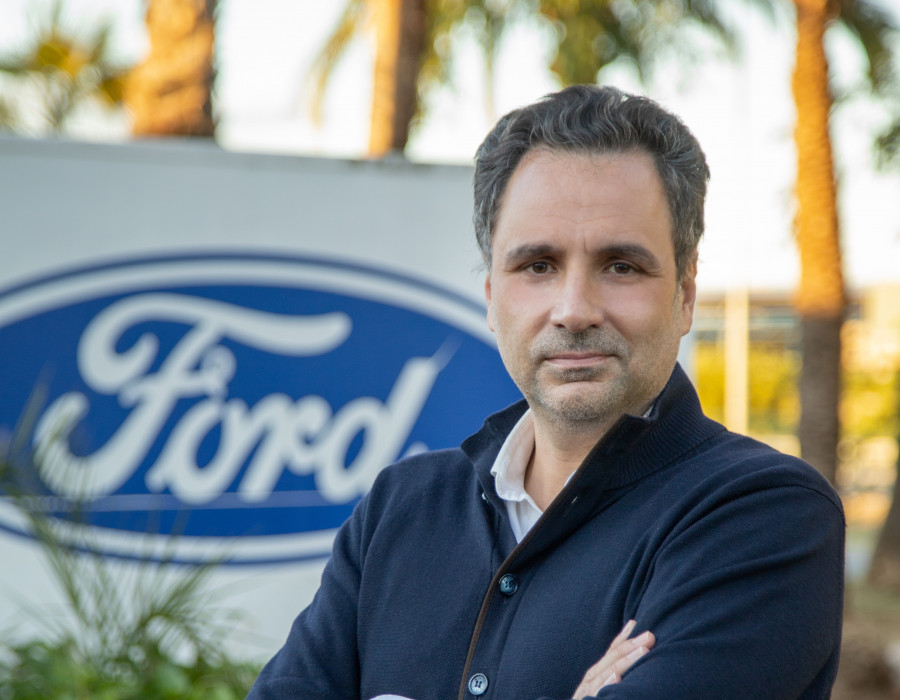“Continuous improvement of competitiveness in vehicle and component manufacturing is essential"

AutoRevista.- The Automotive Industry is going through a transformation towards digitalization and sustainability. What are the suppliers’ requirements and homologation criteria for the whole value chain?
Juan Carlos González.- We have a team based in Spain and Morocco in charge of developing new suppliers’ sites for Ford. We have developed over the years a very thorough methodology supported by our corporate tools and procedures.
First, we evaluate the Product Portfolio and the technical capabilities as well as the innovation ideas of the supplier in conjunction with our Product Development experts. At this stage, other factors are taken into consideration such as the vertical integration, control of the Tier-n supply base, their global footprint and experience as tier 1.
We are designing our optimal long-term footprint based on the components required for the new generation of Electric Vehicles
We use specific analytical tools to understand if this site could deliver a total cost opportunity considering the physicals of the components, specific economic data of the location, freight, and packaging costs.
After this, we start several processes in parallel:
- Our Supplier Technical Assistance Engineer performs a Manufacturing Site Assessment at the supplier’s facilities to ensure that there are robust launch and quality operating systems in place according to the Ford standards and provides improvement requirements. And we continue accompanying them during the whole improvement process ahead, including the supervision of the industrialization plan.
- A financial health audit is also paramount in this process and all along the future relationship with Ford.
- For new suppliers we provide our product specifications so they can learn about our Product Development systems. At a later step, we work together with the supplier to evaluate their product cost structure and help them to understand the Ford quotations systems and procedures.
- We require our suppliers to adhere to the Ford Supplier Code of Conduct and ensure that they have the same requirements of their suppliers and so on throughout the supply chain. Our goal is to develop a strong and sustainable supply base protecting the human rights and the environment in line with the United Nations Guiding Principles and actual legislations
AR.- Is there a focus on developing a network of critical suppliers’ ecosystems much closer to the OEMs Manufacturing sites?
J.C.G.- This industry is in a fast-changing environment with unique challenges ahead. The events happening over the last years have put a greater focus on some critical areas of the value chain:
- Constraints in carriers and increasing costs of freight as well as CO2 footprint requirements penalizing long-distance shipments
- Geopolitical exposure, lack of technical workforce in some markets and potential constraints in the raw materials and components are demanding efforts to look for alternatives to mitigate disruption risks
- New rules of origin to export finished vehicles to some key markets, driving additional localization targets
We continue strengthening the relationships with our key suppliers, regularly exchanging on the effects of these challenges, and setting up action plans together. At the same time, we are designing our optimal long-term footprint based on the components required for the new generation of Electric Vehicles and considering total landed cost, rules of origin and sustainability requirements.
We are communicating to our suppliers how should this optimal footprint look like well ahead of the Product Development phase of the new programs. This optimal footprint is not stopping at the Tier 1 level but looks deeper down in the full value chain.
This optimal footprint is not stopping at the Tier 1 level but looks deeper down in the full value chain
For instance, last year Ford of Europe signed on to two key supply chain initiatives which seek to establish industry standards for data-sharing between partners and the assessment of production sites sustainability.
The first initiative is the Catena-X Automotive Network, established to improve transparency of the supply chain, and to support improvements in sustainability and efficiency. The second is the Responsible Supply Chain Initiative (RSCI), which provides tools, measures, and support to achieve a more sustainable supply chain.
Finally, Ford has recently launched the new Manufacture 2030 climate program to progress in our carbon neutrality goals. It helps our suppliers establish science-based targets, and measure, manage and reduce climate emissions, water usage, and waste. 3,000 global Tier 1 suppliers were invited to participate in Phase 1.
Ford has recently launched the new Manufacture 2030 climate program to progress in our carbon neutrality goals
AR.- What is the value added of the relationship with Automotive Clusters and other Suppliers Associations?
J,C,G.- Ford cooperates with all these Associations as we are convinced that they are fundamental for the industrial development of the country. Its existence allows to:
- Encourage development initiatives that cannot be undertaken by a single company.
- Consolidate the common concerns and needs of multiple companies of varied sizes in the Automotive sector
- Help their members, particularly those with lack of adequate contacts, to establish commercial links with the Purchasing agents of new potential customers.
- Organize discussion forums to improve the commercial relationships and the industry know-how.
- Realize synergies by establishing standardized tools, protocols and processes facilitating a resourceful and lean industry.
Within my team we keep in touch with these associations, particularly to efficiently explore the industry network and be aware of the latest news in the sector.
AR.- How do you think that the Spanish Suppliers Industry should evolve to make Spain an attractive country to manufacture vehicles?
J,C,G.- This industry is more than ever before in a very competitive environment and under a rapid transformation. The continuous improvement of competitiveness is fundamental to continue as one of the leading countries in manufacturing vehicles and components. The focus should be put on the following areas:
- Investments in products and manufacturing systems innovation; especially, the open and collaborative innovation, developing ecosystems around components or technologies requiring multiple firms and long-term investments.
- Faster digitalization of manufacturing facilities, implementing the effective use of data to improve manufacturing processes and data transfer with customers to reduce homologation costs and quality follow up among many other benefits.
- Promote the development of advanced know-how in new technologies and materials.
- Focus on higher value-added products supported by local product development centers.
- Excellence development of the Commercial departments supported by the internal technical know-how.
- Development of the new technologies needed to make the components for the new generation vehicles
- Support and grow the new businesses related to mobility, software and artificial intelligence.
Lea esta entrevista en castellano

Mensajes enfocados a la mejora de la competitividad desde distintos puntos de vista.

El evento, en el que clúster subraya la diversificación a otros sectores, reconoce a Industrias Alegre, Inrema, ITE, Tera Batteries (Alicante) y a Juan Ordóñez

Este acuerdo refuerza la posición de la compañía, con el objetivo de ofrecer a los gestores de flotas, y también a los conductores, un mayor número de servicios digitales y simplificar el proceso de activación de vehículos.
![Firma acuerdo EBRO AC Auto BanK[1] Firma acuerdo EBRO AC Auto BanK[1]](/images/showid2/7417462?w=981&zc=4&zc=1&w=280&h=209)
Juan Manuel Pino, Country Manager CA Auto Bank España, Portugal y Marruecos, comenta para AutoRevista los detalles de un acuerdo que ha permitido a EBRO contar con apoyo financiero para su despegue industrial y comercial en España.

Mientras Europa revisa su mandato sobre vehículos de emisiones cero para 2035, se enfrenta a una cuestión más profunda: ¿cómo liderará la transición ecológica sin perder su fortaleza industrial?
